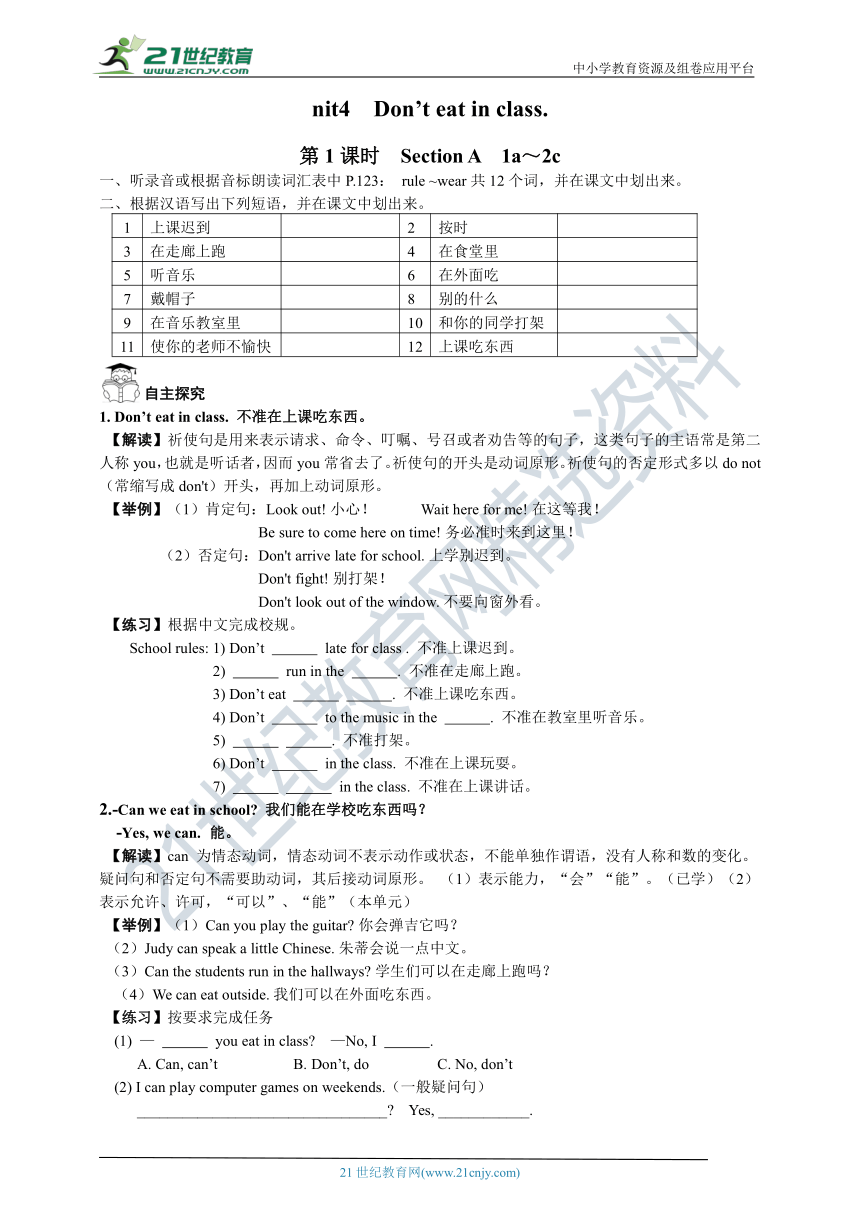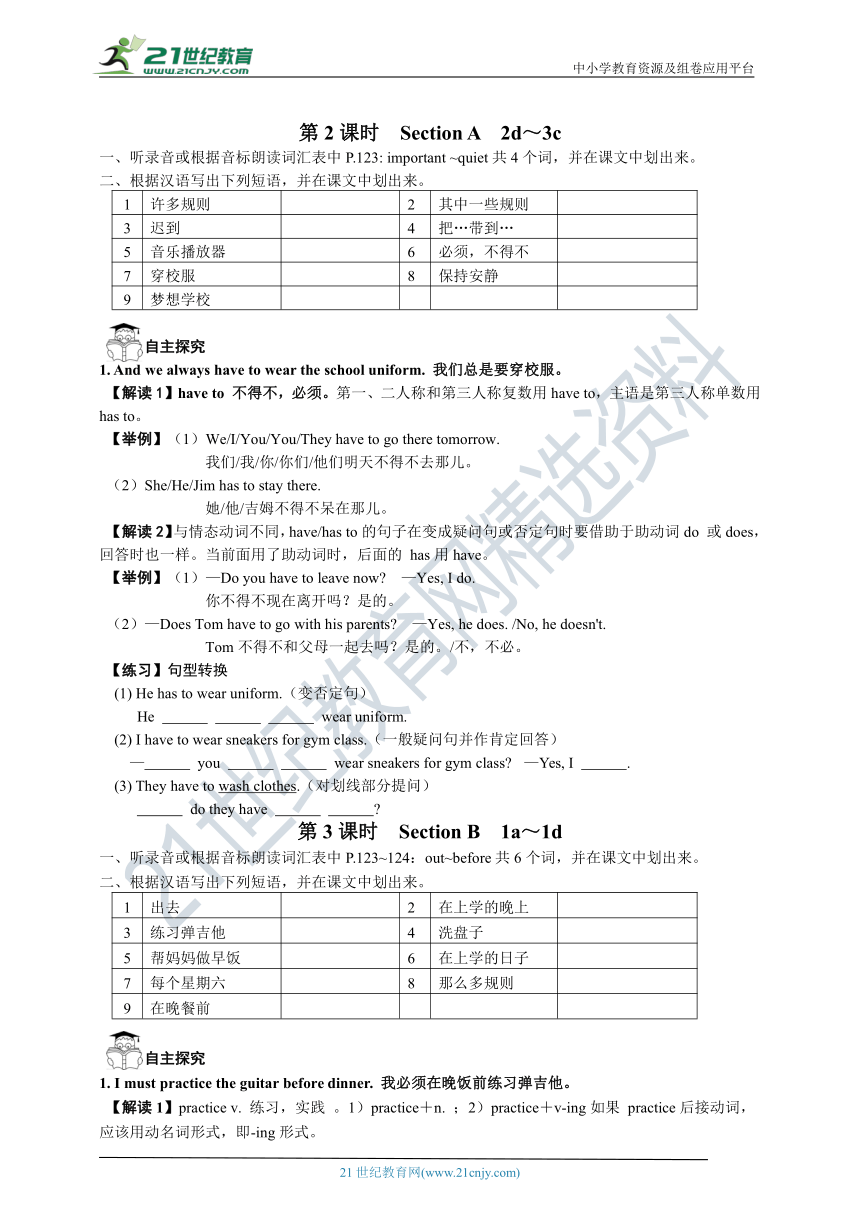Unit 4 Don’t eat in class 单元同步学案(4课时 含答案)
文档属性
| 名称 | Unit 4 Don’t eat in class 单元同步学案(4课时 含答案) |

|
|
| 格式 | zip | ||
| 文件大小 | 1.2MB | ||
| 资源类型 | 试卷 | ||
| 版本资源 | 人教新目标(Go for it)版 | ||
| 科目 | 英语 | ||
| 更新时间 | 2020-08-17 00:00:00 | ||
图片预览



文档简介
中小学教育资源及组卷应用平台
nit4
Don’t
eat
in
class.
第1课时
Section
A
1a~2c
一、听录音或根据音标朗读词汇表中P.123:
rule
~wear共12个词,并在课文中划出来。
二、根据汉语写出下列短语,并在课文中划出来。
1
上课迟到
2
按时
3
在走廊上跑
4
在食堂里
5
听音乐
6
在外面吃
7
戴帽子
8
别的什么
9
在音乐教室里
10
和你的同学打架
11
使你的老师不愉快
12
上课吃东西
自主探究
1.
Don’t
eat
in
class.
不准在上课吃东西。
【解读】祈使句是用来表示请求、命令、叮嘱、号召或者劝告等的句子,这类句子的主语常是第二人称you,也就是听话者,因而you常省去了。祈使句的开头是动词原形。祈使句的否定形式多以do?not(常缩写成don't)开头,再加上动词原形。
【举例】(1)肯定句:Look?out!?小心!
Wait?here?for?me!?在这等我!
Be?sure?to?come?here?on?time!?务必准时来到这里!
(2)否定句:Don't?arrive?late?for?school.?上学别迟到。
Don't?fight!?别打架!
Don't?look?out?of?the?window.?不要向窗外看。
【练习】根据中文完成校规。
School
rules:
1)
Don’t
late
for
class
.
不准上课迟到。
2)
run
in
the
.
不准在走廊上跑。
3)
Don’t
eat
.
不准上课吃东西。
4)
Don’t
to
the
music
in
the
.
不准在教室里听音乐。
5)
.
不准打架。
6)
Don’t
in
the
class.
不准在上课玩耍。
7)
in
the
class.
不准在上课讲话。
2.-Can
we
eat
in
school?
我们能在学校吃东西吗?
-Yes,
we
can.
能。
【解读】can
为情态动词,情态动词不表示动作或状态,不能单独作谓语,没有人称和数的变化。疑问句和否定句不需要助动词,其后接动词原形。
(1)表示能力,“会”“能”。(已学)(2)表示允许、许可,“可以”、“能”(本单元)
【举例】(1)Can?you?play?the?guitar??你会弹吉它吗?
(2)Judy?can?speak?a?little?Chinese.?朱蒂会说一点中文。
(3)Can?the?students?run?in?the?hallways??学生们可以在走廊上跑吗?
(4)We?can?eat?outside.?我们可以在外面吃东西。
【练习】按要求完成任务
(1)
—
you
eat
in
class?
—No,
I
.
A.
Can,
can’t
B.
Don’t,
do
C.
No,
don’t
(2)
I
can
play
computer
games
on
weekends.(一般疑问句)
_________________________________?
Yes,
____________.
第2课时
Section
A
2d~3c
一、听录音或根据音标朗读词汇表中P.123:
important
~quiet共4个词,并在课文中划出来。
二、根据汉语写出下列短语,并在课文中划出来。
1
许多规则
2
其中一些规则
3
迟到
4
把…带到…
5
音乐播放器
6
必须,不得不
7
穿校服
8
保持安静
9
梦想学校
自主探究
1.
And
we
always
have
to
wear
the
school
uniform.
我们总是要穿校服。
【解读1】have
to
不得不,必须。第一、二人称和第三人称复数用have
to,主语是第三人称单数用has
to。
【举例】(1)We/I/You/You/They
have
to
go
there
tomorrow.
我们/我/你/你们/他们明天不得不去那儿。
(2)She/He/Jim
has
to
stay
there.
她/他/吉姆不得不呆在那儿。
【解读2】与情态动词不同,have/has
to的句子在变成疑问句或否定句时要借助于助动词do
或does,回答时也一样。当前面用了助动词时,后面的
has用have。
【举例】(1)—Do
you
have
to
leave
now?
—Yes,
I
do.
你不得不现在离开吗?是的。
(2)—Does
Tom
have
to
go
with
his
parents?
—Yes,
he
does.
/No,
he
doesn't.
Tom不得不和父母一起去吗?是的。/不,不必。
【练习】句型转换
(1)
He
has
to
wear
uniform.(变否定句)
He
wear
uniform.
(2)
I
have
to
wear
sneakers
for
gym
class.(一般疑问句并作肯定回答)
—
you
wear
sneakers
for
gym
class?
—Yes,
I
.
(3)
They
have
to
wash
clothes.(对划线部分提问)
do
they
have
?
第3课时
Section
B
1a~1d
一、听录音或根据音标朗读词汇表中P.123~124:out~before共6个词,并在课文中划出来。
二、根据汉语写出下列短语,并在课文中划出来。
1
出去
2
在上学的晚上
3
练习弹吉他
4
洗盘子
5
帮妈妈做早饭
6
在上学的日子
7
每个星期六
8
那么多规则
9
在晚餐前
自主探究
1.
I
must
practice
the
guitar
before
dinner.
我必须在晚饭前练习弹吉他。
【解读1】practice
v.
练习,实践
。1)practice+n.
;2)practice+v-ing如果
practice后接动词,应该用动名词形式,即-ing形式。
【举例】(1)You
must
practice
your
spoken
English
every
day.
你必须每天练习你的英语口语。
(2)Jim
practices
playing
the
piano
every
day.
吉姆每天练习弹钢琴。
【解读2】must与have
to
的用法区别:must
和have
to
都有“必须“的意思,但must
强调主观看法,
have
to
强调客观需要。二者有时可以互换。在口语中,
have
to
用得较为广泛些。
have
to
可用于多种时态,must则不能。
【举例】(1)We
must
practice
every
day
to
win
the
match.
为了赢得比赛,我们必须每天训练。
(2)It’s
too
late.
I
have
to
go
home.
太晚了,我必须回家了。
【练习】用所给词的适当形式填空。
1.
I
have
to
practice
(play)
the
piano
every
day.
2.
he
(have
to)
go
to
the
Children’s
Palace
(practice)
the
piano?
3.
Molly
must
(read)
a
book
every
week.
第4课时
Section
B
2a~Self
check
一、听录音或根据音标朗读词汇表中P.124
make
(one’s)
bed~learner共18个词,并在课文中划出来。
二、根据汉语写出下列短语,并在课文中划出来。
1
太多规则
2
整理床铺
3
把脏盘子留在厨房
4
跑步去学校
5
吵闹
6
有更多的规则
7
在周末
8
读书
9
对…要求严格
10
遵循规则
11
留短发
12
学习弹钢琴
自主探究
1.
There
are
too
many
rules.
有太多规则。
【解读】too
many,
too
much和too
much的用法区别:
1.
too
many的中心词是many,
用法与many相同,用来修饰复数可数名词.
2.
too
much的中心词是much,
用法与much相同,用来修饰不可数名词。
3.
much
too的中心词是too,
用法与too相同,用来修饰原级形容词或副词。
【举例】(1)He
gets
too
many
questions
to
ask
you.
他有很多问题要问你。
(2)We
both
have
too
much
work
to
do.
我们俩都有很多工作要做。
(3)
You're
walking
much
too
fast.
Slow
down.
你走得太快了,
慢点。
【练习】用
too
many,
too
much,
much
too填空。
1.
They
bought
eggs
yesterday.
2.
The
teacher
told
him
not
to
spend
time
playing
games
3.
It's
cold
outside.
You'd
better
put
on
your
overcoat.
2.
After
dinner,
I
can’t
relax,
either.
晚饭后,我也不能休息。
【解读】either,too,also的用法区别:
either意为“也”,用在否定句中,必须放在句末。
too意为“也”,一般用在肯定句中,放在句末。
also意为“也”,一般来说,是比较正式的用语,它经常放在句中,其位置在行为动词之前,be动词,助动词和情态动词之后。
【举例】(1)He
didn’t
come,
his
brother
didn’t
,either.
他没有来,他弟弟也没有来。
(2)Her
husband
is
a
singer,
she
is
a
singer
too.
她丈夫是一位歌唱家,她也是一位歌唱家。
(3)I
can
also
tell
you
a
story.
我也能给你讲个故事。
【练习】用either,
also和too填空。
1.
I?am?
?studying?English.
2.
My?father?likes?reading,?and?I?do,
.
3.
I?can’t
play?the?piano.
He?can’t_______.
4.
He?will?go?to?town?tomorrow,?I’ll?
?go.
5.
I?don’t?love?chocolate.?I?don’t?love?pizza?
.??
参考答案:
Unit4
Don’t
eat
in
class.
第1课时
Section
A
1a~2c
二、短语理解
1.
arrive
late
for
school
2.
on
time
3.
run
in
the
hallways
4.
in
the
dining
hall
5.
listen
to
music
6.
eat
outside
7.
wear
a
hat
8.
what
else
9.
in
the
music
room
10.
fight
with
your
classmates
11.
make
your
teacher
unhappy
12.
eat
in
class
自主探究
1.
arrive,
Don’t,
hallways,
in
class,
listen,
classroom,
Don’t
fight,
play,
Don’t
talk
2.
A
Can
you
play
computer
games
on
weekends?
I
can
第2课时
Section
A
2d~3c
二、短语理解
1.
a
lot
of
rules
2.
some
of
the
rules
3.
be
late
for
4.
bring…to
5.
music
player
6.
have
to
7.
wear
the
school
uniform
8.
be
quiet
9.
dream
school
自主探究
1.
doesn’t
have
to
2.
Do,
have
to,
do
3.
What,to
do
第3课时
Section
B
1a~1d
二、短语理解
1.
go
out
2.
on
school
nights
3.
practice
the
guitar
4.
do
the
dishes
5.
help
his
mom
make
breakfast
6.
on
school
days
7.
every
Saturday
8.
so
many
rules
9.
before
dinner
自主探究
1.
playing
2.
Does,
have
to,
to
practice
3.
read
第4课时
Section
B
2a~Self
check
二、短语理解
1.
too
many
rules
2.
make
(one’s)
bed
3.
leave
the
dirty
dishes
in
the
kitchen
4.
run
to
school
5.
be
noisy
6.
have
more
rules
7.on
weekends
8.
read
a
book
9.
be
strict
(with
sb.)
10.
follow
the
rules
11.
keep
my
hair
short
12.
learn
to
play
the
piano
自主探究
1.
(1)
too
many
(2)
too
much
(3)
much
too
2.
(1)
also
(2)
too
(3)
either
(4)
also
(5)
either
21世纪教育网
www.21cnjy.com
精品试卷·第
2
页
(共
2
页)
HYPERLINK
"http://21世纪教育网(www.21cnjy.com)
"
21世纪教育网(www.21cnjy.com)
nit4
Don’t
eat
in
class.
第1课时
Section
A
1a~2c
一、听录音或根据音标朗读词汇表中P.123:
rule
~wear共12个词,并在课文中划出来。
二、根据汉语写出下列短语,并在课文中划出来。
1
上课迟到
2
按时
3
在走廊上跑
4
在食堂里
5
听音乐
6
在外面吃
7
戴帽子
8
别的什么
9
在音乐教室里
10
和你的同学打架
11
使你的老师不愉快
12
上课吃东西
自主探究
1.
Don’t
eat
in
class.
不准在上课吃东西。
【解读】祈使句是用来表示请求、命令、叮嘱、号召或者劝告等的句子,这类句子的主语常是第二人称you,也就是听话者,因而you常省去了。祈使句的开头是动词原形。祈使句的否定形式多以do?not(常缩写成don't)开头,再加上动词原形。
【举例】(1)肯定句:Look?out!?小心!
Wait?here?for?me!?在这等我!
Be?sure?to?come?here?on?time!?务必准时来到这里!
(2)否定句:Don't?arrive?late?for?school.?上学别迟到。
Don't?fight!?别打架!
Don't?look?out?of?the?window.?不要向窗外看。
【练习】根据中文完成校规。
School
rules:
1)
Don’t
late
for
class
.
不准上课迟到。
2)
run
in
the
.
不准在走廊上跑。
3)
Don’t
eat
.
不准上课吃东西。
4)
Don’t
to
the
music
in
the
.
不准在教室里听音乐。
5)
.
不准打架。
6)
Don’t
in
the
class.
不准在上课玩耍。
7)
in
the
class.
不准在上课讲话。
2.-Can
we
eat
in
school?
我们能在学校吃东西吗?
-Yes,
we
can.
能。
【解读】can
为情态动词,情态动词不表示动作或状态,不能单独作谓语,没有人称和数的变化。疑问句和否定句不需要助动词,其后接动词原形。
(1)表示能力,“会”“能”。(已学)(2)表示允许、许可,“可以”、“能”(本单元)
【举例】(1)Can?you?play?the?guitar??你会弹吉它吗?
(2)Judy?can?speak?a?little?Chinese.?朱蒂会说一点中文。
(3)Can?the?students?run?in?the?hallways??学生们可以在走廊上跑吗?
(4)We?can?eat?outside.?我们可以在外面吃东西。
【练习】按要求完成任务
(1)
—
you
eat
in
class?
—No,
I
.
A.
Can,
can’t
B.
Don’t,
do
C.
No,
don’t
(2)
I
can
play
computer
games
on
weekends.(一般疑问句)
_________________________________?
Yes,
____________.
第2课时
Section
A
2d~3c
一、听录音或根据音标朗读词汇表中P.123:
important
~quiet共4个词,并在课文中划出来。
二、根据汉语写出下列短语,并在课文中划出来。
1
许多规则
2
其中一些规则
3
迟到
4
把…带到…
5
音乐播放器
6
必须,不得不
7
穿校服
8
保持安静
9
梦想学校
自主探究
1.
And
we
always
have
to
wear
the
school
uniform.
我们总是要穿校服。
【解读1】have
to
不得不,必须。第一、二人称和第三人称复数用have
to,主语是第三人称单数用has
to。
【举例】(1)We/I/You/You/They
have
to
go
there
tomorrow.
我们/我/你/你们/他们明天不得不去那儿。
(2)She/He/Jim
has
to
stay
there.
她/他/吉姆不得不呆在那儿。
【解读2】与情态动词不同,have/has
to的句子在变成疑问句或否定句时要借助于助动词do
或does,回答时也一样。当前面用了助动词时,后面的
has用have。
【举例】(1)—Do
you
have
to
leave
now?
—Yes,
I
do.
你不得不现在离开吗?是的。
(2)—Does
Tom
have
to
go
with
his
parents?
—Yes,
he
does.
/No,
he
doesn't.
Tom不得不和父母一起去吗?是的。/不,不必。
【练习】句型转换
(1)
He
has
to
wear
uniform.(变否定句)
He
wear
uniform.
(2)
I
have
to
wear
sneakers
for
gym
class.(一般疑问句并作肯定回答)
—
you
wear
sneakers
for
gym
class?
—Yes,
I
.
(3)
They
have
to
wash
clothes.(对划线部分提问)
do
they
have
?
第3课时
Section
B
1a~1d
一、听录音或根据音标朗读词汇表中P.123~124:out~before共6个词,并在课文中划出来。
二、根据汉语写出下列短语,并在课文中划出来。
1
出去
2
在上学的晚上
3
练习弹吉他
4
洗盘子
5
帮妈妈做早饭
6
在上学的日子
7
每个星期六
8
那么多规则
9
在晚餐前
自主探究
1.
I
must
practice
the
guitar
before
dinner.
我必须在晚饭前练习弹吉他。
【解读1】practice
v.
练习,实践
。1)practice+n.
;2)practice+v-ing如果
practice后接动词,应该用动名词形式,即-ing形式。
【举例】(1)You
must
practice
your
spoken
English
every
day.
你必须每天练习你的英语口语。
(2)Jim
practices
playing
the
piano
every
day.
吉姆每天练习弹钢琴。
【解读2】must与have
to
的用法区别:must
和have
to
都有“必须“的意思,但must
强调主观看法,
have
to
强调客观需要。二者有时可以互换。在口语中,
have
to
用得较为广泛些。
have
to
可用于多种时态,must则不能。
【举例】(1)We
must
practice
every
day
to
win
the
match.
为了赢得比赛,我们必须每天训练。
(2)It’s
too
late.
I
have
to
go
home.
太晚了,我必须回家了。
【练习】用所给词的适当形式填空。
1.
I
have
to
practice
(play)
the
piano
every
day.
2.
he
(have
to)
go
to
the
Children’s
Palace
(practice)
the
piano?
3.
Molly
must
(read)
a
book
every
week.
第4课时
Section
B
2a~Self
check
一、听录音或根据音标朗读词汇表中P.124
make
(one’s)
bed~learner共18个词,并在课文中划出来。
二、根据汉语写出下列短语,并在课文中划出来。
1
太多规则
2
整理床铺
3
把脏盘子留在厨房
4
跑步去学校
5
吵闹
6
有更多的规则
7
在周末
8
读书
9
对…要求严格
10
遵循规则
11
留短发
12
学习弹钢琴
自主探究
1.
There
are
too
many
rules.
有太多规则。
【解读】too
many,
too
much和too
much的用法区别:
1.
too
many的中心词是many,
用法与many相同,用来修饰复数可数名词.
2.
too
much的中心词是much,
用法与much相同,用来修饰不可数名词。
3.
much
too的中心词是too,
用法与too相同,用来修饰原级形容词或副词。
【举例】(1)He
gets
too
many
questions
to
ask
you.
他有很多问题要问你。
(2)We
both
have
too
much
work
to
do.
我们俩都有很多工作要做。
(3)
You're
walking
much
too
fast.
Slow
down.
你走得太快了,
慢点。
【练习】用
too
many,
too
much,
much
too填空。
1.
They
bought
eggs
yesterday.
2.
The
teacher
told
him
not
to
spend
time
playing
games
3.
It's
cold
outside.
You'd
better
put
on
your
overcoat.
2.
After
dinner,
I
can’t
relax,
either.
晚饭后,我也不能休息。
【解读】either,too,also的用法区别:
either意为“也”,用在否定句中,必须放在句末。
too意为“也”,一般用在肯定句中,放在句末。
also意为“也”,一般来说,是比较正式的用语,它经常放在句中,其位置在行为动词之前,be动词,助动词和情态动词之后。
【举例】(1)He
didn’t
come,
his
brother
didn’t
,either.
他没有来,他弟弟也没有来。
(2)Her
husband
is
a
singer,
she
is
a
singer
too.
她丈夫是一位歌唱家,她也是一位歌唱家。
(3)I
can
also
tell
you
a
story.
我也能给你讲个故事。
【练习】用either,
also和too填空。
1.
I?am?
?studying?English.
2.
My?father?likes?reading,?and?I?do,
.
3.
I?can’t
play?the?piano.
He?can’t_______.
4.
He?will?go?to?town?tomorrow,?I’ll?
?go.
5.
I?don’t?love?chocolate.?I?don’t?love?pizza?
.??
参考答案:
Unit4
Don’t
eat
in
class.
第1课时
Section
A
1a~2c
二、短语理解
1.
arrive
late
for
school
2.
on
time
3.
run
in
the
hallways
4.
in
the
dining
hall
5.
listen
to
music
6.
eat
outside
7.
wear
a
hat
8.
what
else
9.
in
the
music
room
10.
fight
with
your
classmates
11.
make
your
teacher
unhappy
12.
eat
in
class
自主探究
1.
arrive,
Don’t,
hallways,
in
class,
listen,
classroom,
Don’t
fight,
play,
Don’t
talk
2.
A
Can
you
play
computer
games
on
weekends?
I
can
第2课时
Section
A
2d~3c
二、短语理解
1.
a
lot
of
rules
2.
some
of
the
rules
3.
be
late
for
4.
bring…to
5.
music
player
6.
have
to
7.
wear
the
school
uniform
8.
be
quiet
9.
dream
school
自主探究
1.
doesn’t
have
to
2.
Do,
have
to,
do
3.
What,to
do
第3课时
Section
B
1a~1d
二、短语理解
1.
go
out
2.
on
school
nights
3.
practice
the
guitar
4.
do
the
dishes
5.
help
his
mom
make
breakfast
6.
on
school
days
7.
every
Saturday
8.
so
many
rules
9.
before
dinner
自主探究
1.
playing
2.
Does,
have
to,
to
practice
3.
read
第4课时
Section
B
2a~Self
check
二、短语理解
1.
too
many
rules
2.
make
(one’s)
bed
3.
leave
the
dirty
dishes
in
the
kitchen
4.
run
to
school
5.
be
noisy
6.
have
more
rules
7.on
weekends
8.
read
a
book
9.
be
strict
(with
sb.)
10.
follow
the
rules
11.
keep
my
hair
short
12.
learn
to
play
the
piano
自主探究
1.
(1)
too
many
(2)
too
much
(3)
much
too
2.
(1)
also
(2)
too
(3)
either
(4)
also
(5)
either
21世纪教育网
www.21cnjy.com
精品试卷·第
2
页
(共
2
页)
HYPERLINK
"http://21世纪教育网(www.21cnjy.com)
"
21世纪教育网(www.21cnjy.com)
同课章节目录
- Unit 1 Can you play the guitar?
- Section A
- Section B
- Unit 2 What time do you go to school?
- Section A
- Section B
- Unit 3 How do you get to school?
- Section A
- Section B
- Unit 4 Don't eat in class.
- Section A
- Section B
- Unit 5 Why do you like pandas?
- Section A
- Section B
- Unit 6 I'm watching TV.
- Section A
- Section B
- Review of Units 1-6
- Unit 7 It's raining!
- Section A
- Section B
- Unit 8 Is there a post office near here?
- Section A
- Section B
- Unit 9 What does he look like?
- Section A
- Section B
- Unit 10 I'd like some noodles.
- Section A
- Section B
- Unit 11 How was your school trip?
- Section A
- Section B
- Unit 12 What did you do last weekend?
- Section A
- Section B
